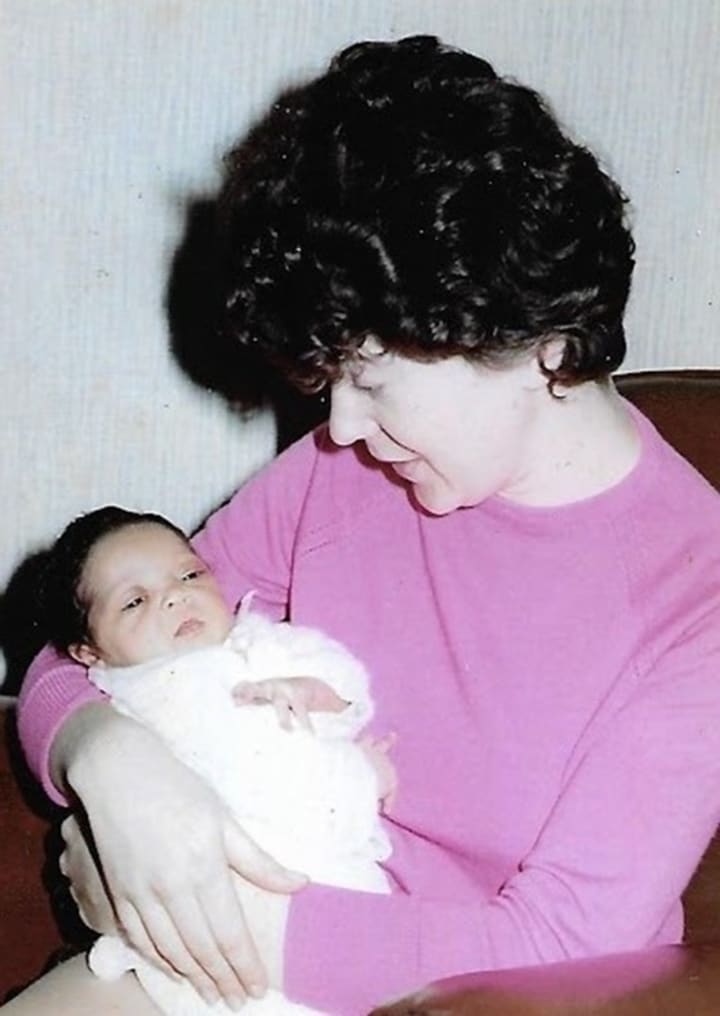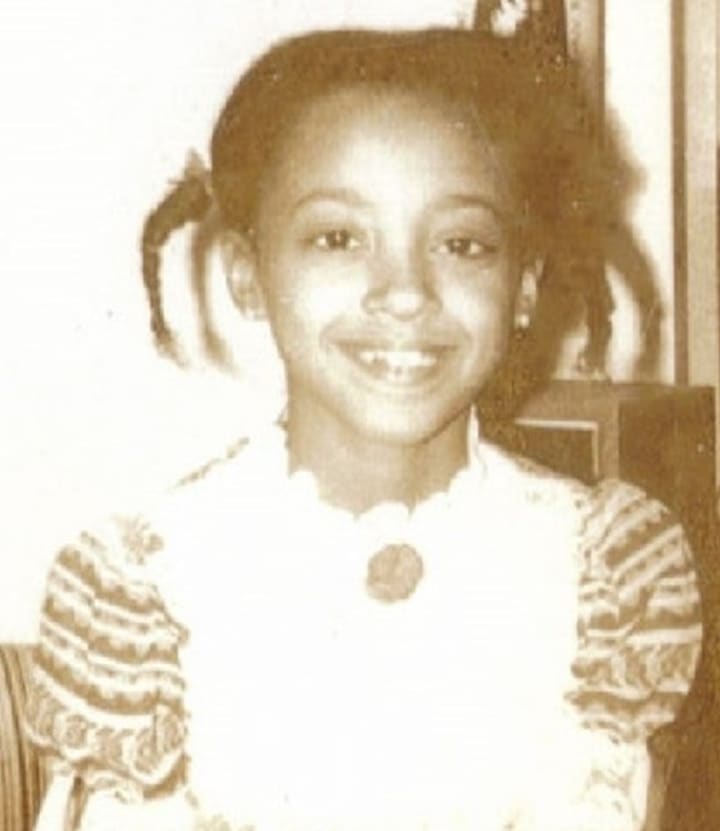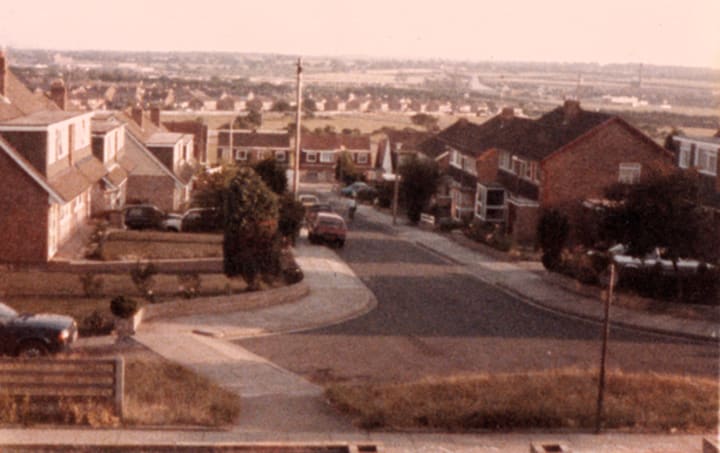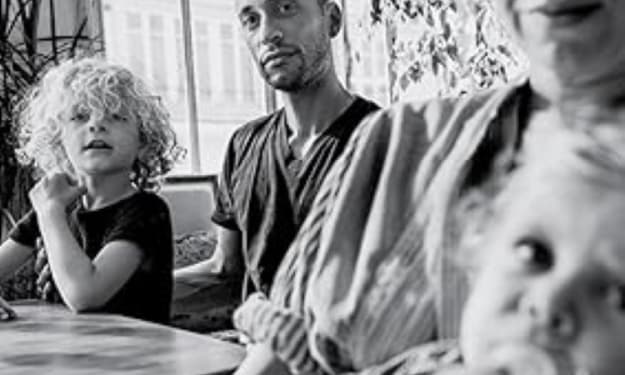As a Black Biracial child, I struggled with racial bullying when my family relocated to Liverpool, UK in the 1980s.
"When I left Nigeria, I left behind my innocence, my carefreeness, along with the luxury of simply being a human being."

It was about 1983. My younger sister and I were returning home from our school in Liverpool. On the final leg of our journey, soon after disembarking from the bus, a group of boys on bikes chased us, yelling racial slurs.
“What school do you go to, anyway, n***er school?!” they taunted in their raucous Scouse (Liverpool) voices.
This was one in a series of painful events that impressed upon me that my visible half-Blackness seemed to wipe out the half-white side when it came to most white people. But my story begins 13 years earlier.

In December 1969, I was born to an English-Greek mother and Nigerian father in the English town of Stoke-on-Trent; at this point, we did not stay long in the UK. From the ages of one to five, my parents and I lived in the US university town of Amherst, Massachusetts, and from the ages of five to nearly eleven, I lived with my family in Nigeria.
My early identity in Nigeria was simple: I considered myself to be a person of mixed parentage. This was a natural assumption in the uncomplicated world where we then lived, largely free of the racial hangups in Western countries. Furthermore, there were several mixed heritage families in our social circles, so we were able to regularly socialize with children with similar ethnic backgrounds.
Interestingly, in view of my paradoxical experiences with white people, some Nigerian children called me “oyibo,” literally meaning, “white person,” due to my lighter skin tone as compared with the average Nigerian. Despite this, it is important to note that - outside of the declining white expatriate circles - there was no consciousness of “Black” vs “white” in the Western sense. As a then-independent country, for the most part, there was no social hierarchy based on color.
Thus, the social meaning of the term “Black” was never a thing for me in Nigeria, that is, until my parents informed my siblings and me that we would be soon relocating to the UK. We were told in no uncertain terms that our lives would be changing dramatically, for in England, we would be regarded as “Black,” not “mixed,” and this had grave implications in terms of how we would be treated, since being Black meant that we would be forced to face something horrible called “racism.”
As a young girl, it was tempting to rationalize, “Okay, we’re moving to this white country, but surely, having a white mother will somehow save me from this impending doom.” One thing was certain though: when I left Nigeria, I left behind my innocence, my carefreeness, along with the luxury of simply being a human being. Only later did I realize how fortunate I was to have experienced these prejudice-free years.

After a temporary stay in Derbyshire, England, we eventually relocated to the town of Birkenhead, near Liverpool, in the North West of England. (Birkenhead is on the Wirral Peninsula, which is across the River Mersey from Liverpool - about five minutes away by train.)
Although my parents did not know this at the time, the decision to move to the Liverpool area - following a job offer - was to be a catastrophic one for our family. Liverpool had long been - and continues to be, in the 2020s - one of the most racially hostile cities in England. In 1989, the Gifford Report described the racism in Liverpool as “uniquely horrific.”
I started attending an all-girls school in Liverpool in April 1982, which at that time, was a virtually all-white institution. I soon realized that my “half-whiteness” would not save me from the harshness of the everyday othering, rejection and frequent hostility that I faced there.
That same month, a naïve and cringeworthy yet catchy racial harmony song “Ebony and Ivory” reached number one in the UK charts. Ironically, it was written by one of Liverpool’s foremost sons, Paul McCartney and performed as a duet with Stevie Wonder. The two distinguished musicians crooned:
“Ebony and ivory
Live together in perfect harmony
Side by side on my piano keyboard
Oh Lord, why don't we?”
Unfortunately, “living in perfect harmony” was not my experience. The girls in my class didn’t see me as representing a combination of ebony and ivory; rather, they looked at the 12-year-old me like I was some strange creature that had beamed down from outer space.
I was socially ostracized for the first year at the school. Then four girls “accepted” me into their circle of "friends" - after I had impressed Ella, the de facto group leader with my jokes. However, they never let me forget that I wasn’t one of them, constantly finding ways to belittle me. For the next three years, they repeatedly impressed upon me that I was to blame for my initial isolation.
“You used to be really weird, really unfriendly,” my new friends insisted in their middle-class Liverpool accents.
On one occasion, we were talking about our respective ethnicities. One member of the clique, Sally, said that she was one quarter German, while another girl shared that she was one quarter Spanish. When it came to my turn, they took great delight in abbreviating the Nigerian part of my ancestry with the acronym “NIG,” all of them proceeding to laugh hysterically.
Although I invited some of these “friends” to my home, no one in the group ever invited me in return. The one piece of “feedback” I got about my family from group leader Ella, was, “Why does your father look so ‘negroey.’”
From the ages of 13 to 16, every day, without fail, Ella would greet me as if I was a toddler: “How is Clare?”, she’d whisper, her yellowish-hazel eyes glowing, seemingly unaware of the oddness of her unique “Clare greeting,” so different from the normal “Hi” that was reserved for the other girls.
While my coping mechanism usually consisted of ignoring this bizarre behavior, the constant humiliation took its toll. I knew that direct confrontation would be useless; when I had previously tried to stand up for myself, a bully outside of our “friends’ group” berated me in front of the whole class for being “ungrateful” to Ella.
While, for the most part, the bigotry I faced at school was covert, the racial animosity that I encountered in public places was extremely in-your-face.
Unlike the mixed folk who are light enough to blend into the white majority, relatively unscathed, my manifestation of mixedness didn’t spare me from the wrath of the men and boys in our local area. In those days, my afro hair was unstyled, and when I walked past groups of youths at the local shops, they would hiss, “Black Bastard.” When my sister and I looked out of my bedroom window, a group of skinheads once shouted, “What are those wogs doing up there?” as my mother desperately begged us, “Get away from the window!”

Reminiscent of the Jim Crow South described in author Richard Wright’s memoir, adults in Liverpool constantly monitored my facial expression. On one occasion, when I was walking down a street, a carload of men stopped their car, ordering me to “Smile!”
My circumstances started to improve when I was 16. My mother received some hair care advice from an acquaintance which she shared with me. The resulting new hair regimen enabled me to fashion my hair into a style that was more acceptable to the local community. I also started wearing contact lenses around this time. My new appearance seemed to have the effect of reducing the incidents of racial abuse that I had become accustomed to.
**********************************************************************
My experiences in Liverpool taught me that my half-whiteness did not represent a get-out-of-jail-card from racism. While I did get some “white privilege” from my mother, it was always by proxy, contingent on her physical presence beside me, as well as her active interventions. For example, eventually, my mother was able to arrange for my sister and I to get a ride from our home in Birkenhead to our school in Liverpool. Another parent was kind enough to let us join her and her daughter in their morning commute; however, I’m doubtful that she would have done this for us if my mother had not been white and well-educated.
Life as a Black biracial child in 1980s Liverpool was an ordeal from which I am still recovering. Forty-two years on from McCartney’s “Ebony and Ivory” duet, fortunately, there has been a move away from the racial naivety of that song and era to a greater willingness to honestly engage with the nuances and impact of everyday racism. Being able to finally write frankly about my experiences is allowing me to externalize painful events; reframe false narratives; and exorcize the demons of the past.
About the Creator
Clare Xanthos
Writer, scholar and researcher specializing in racial equity, racial health equity and racial justice. Co-editor of: "Social Determinants of Health among African-American Men." PhD in Social Policy (London School of Economics).
Enjoyed the story? Support the Creator.
Subscribe for free to receive all their stories in your feed. You could also pledge your support or give them a one-off tip, letting them know you appreciate their work.






Comments
There are no comments for this story
Be the first to respond and start the conversation.